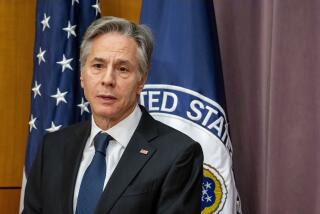Bush Doubtful on Gorbachev’s $100 Billion
WASHINGTON — President Bush on Thursday praised Soviet President Mikhail S. Gorbachev’s commitment to economic reform but cast doubt on Gorbachev’s request for massive Western aid to the faltering Soviet economy.
“A hundred billion dollars is a large piece of change,” Bush told a press conference in the White House Rose Garden, referring to Gorbachev’s suggestion Wednesday that the Soviets will need that much in Western aid to get through the next stage of economic reforms.
Bush’s press conference ostensibly was called to announce the reappointment of Gen. Colin L. Powell as chairman of the Joint Chiefs of Staff, an ordinarily routine move.
But more important for the White House, the session, which took place early in the morning when Bush is freshest, gave the President and his aides a chance to push home their favored theme for the week--that Bush is back, feeling healthy and no longer hampered by his wayward thyroid gland. Driving the point home further, Bush assembled reporters again in mid-afternoon for a second press conference, this time on the White House driveway.
“Gorbachev, I am still convinced, is working the reform path, working the perestroika path,” Bush said at his second appearance. “I’m not going to pull the rug out from under him.
“We are in a critical time here,” the President added, saying that he is expecting a special envoy from Gorbachev next week and had spoken earlier in the day with British Prime Minister John Major about whether Gorbachev should be invited to July’s summit meeting of the leaders of the seven major industrialized democracies, which is scheduled for London. He and Major are “in exact sync,” Bush said.
White House officials said that the President, who on Soviet policy has tended to make decisions with little notice to others in his Administration, is weighing a variety of possibilities.
Among the options would be granting most-favored-nation trade status to the Soviets, a step that may now be possible because of the Soviet Parliament’s action on a new law lifting travel restrictions on Soviet citizens. Another possibility would be some new Western aid package.
Whatever plan is offered could be announced at the London meeting. Or, if the leaders of the so-called Group of Seven would prefer not to turn the London meeting into a session dominated by Gorbachev, Bush might decide to go to Moscow separately, either before London or afterward. A Moscow summit is being discussed, in any case, to sign arms control agreements if additional details on those pacts can be worked out in time.
Bush carefully avoided tipping his hand on any of those options. “I tried to answer the question as vaguely as possible until we know more,” Bush said at one point. “You can’t pin me down on it.”
But while the double dose of press conferences did little to clarify what Bush will do in response to Gorbachev’s request, it probably did help the White House in its campaign to erase the public image of Bush as a convalescent.
White House aides have been troubled all week by the picture left Monday afternoon when Bush, appearing drawn and sounding hoarse, appeared at a press conference alongside the robust German Chancellor Helmut Kohl. Ever since, they have been seeking to erase that image.
On Wednesday, Bush granted an interview to veteran UPI White House correspondent Helen Thomas designed to put out the word that his health is improved. In the course of the interview, however, Bush conceded that because of his medication he had experienced some “slowing down of the mental process” when answering questions. That remark was the most widely reported aspect of the interview.
So Bush tried again. “I’m back, 100% snapped-back and still sharp as a tack and ready to field the most tough question and do it rapidly,” he said in the second press conference Thursday.
“I’ve been tired, and the medicine is known to do that to people,” he conceded, but now “I really am feeling good. . . . I hope to exercise this weekend.
“I think the American people have been subjected to perhaps an overdose of analysis on this, but people are interested, and I’m flattered by the interest,” he added.
Bush also used his appearances to praise two senior members of his Administration, Powell and Secretary of State James A. Baker III.
Baker ran into heavy fire on Capitol Hill on Thursday for his statements a day earlier criticizing Israeli settlements.
“I strongly support what he said, and I strongly support what he is trying to do. . . . I am 100% for him,” Bush said. “We would like to see those settlements stopped, and I am glad I had the chance to put a little period and exclamation point on that.” He added that the Administration position on settlements is “age-old policy.”
Baker, for his part, repeated his criticisms of Israeli policy while adding that “I am not in the business of pinning blame. . . . There is plenty of room for movement by both sides.”
As for Powell, Bush praised the general’s advice during the Persian Gulf crisis. Responding to reports in a book by Washington Post reporter Bob Woodward that Powell’s initial advice had been inclined against going to war, Bush said that Powell and other military officials “leveled with me.”
“He told me the risks, he told me what was at stake in human life.”
Times staff writer Norman Kempster contributed to this article.
More to Read
Get the L.A. Times Politics newsletter
Deeply reported insights into legislation, politics and policy from Sacramento, Washington and beyond. In your inbox three times per week.
You may occasionally receive promotional content from the Los Angeles Times.










